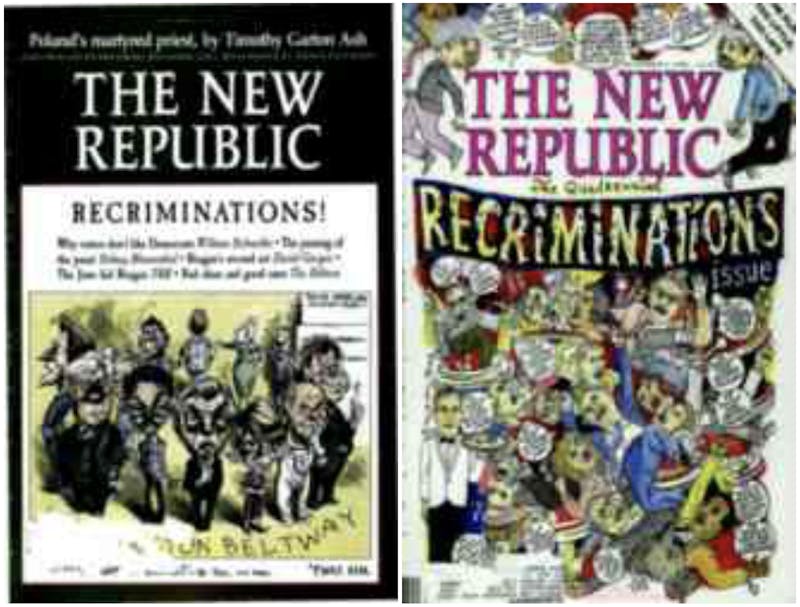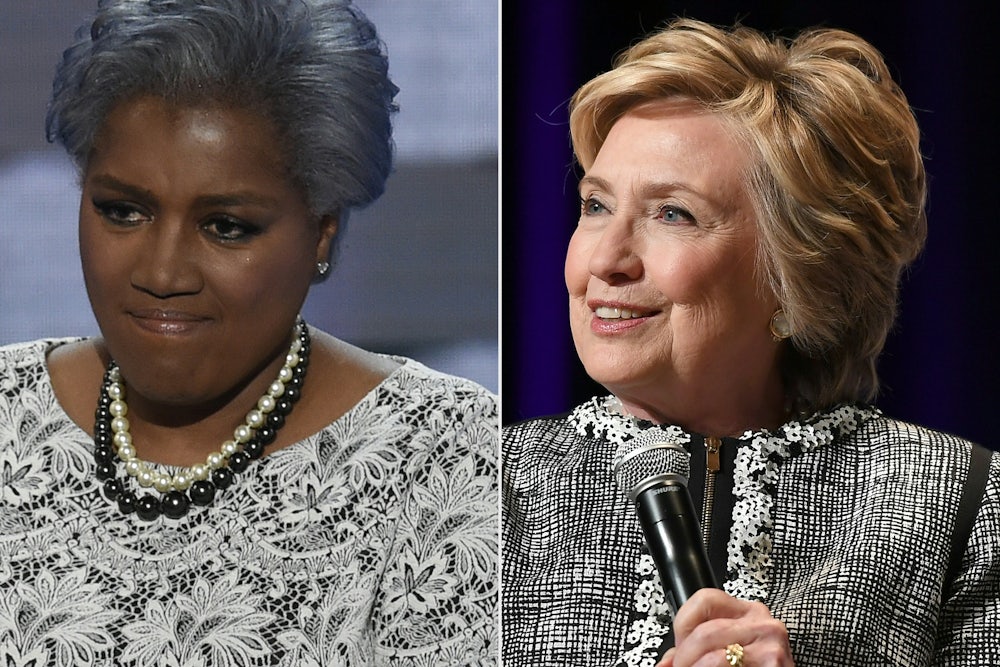If the Democrats’ self-inflicted wounds were at all healing this year, Donna Brazile just ripped them open again. In a Politico excerpt from her forthcoming tell-all memoir, the former interim head of the Democratic National Committee describes the “mess” she inherited from her ousted predecessor, Debbie Wasserman Schultz, and her discovery of an agreement between the DNC and Hillary Clinton’s campaign that “specified that in exchange for raising money and investing in the DNC, Hillary would control the party’s finances, strategy, and all the money raised”—which, she said, “sure looked unethical” and “compromised the party’s integrity.”
Asked by CNN’s Jake Tapper if these revelations prove the Democratic primaries were rigged against Bernie Sanders, Senator Elizabeth Warren said, “Yes.” Meanwhile, more than 100 Clinton staffers took issue with another apparent bombshell in Brazile’s book: that after Clinton’s fainting spell in September 2016, Brazile considered proposing that Clinton and running mate Tim Kaine be replaced with Joe Biden and Cory Booker. “We were shocked to learn the news that Donna Brazile actively considered overturning the will of the Democratic voters,” the staffers wrote in an open letter posted on Saturday. “It is particularly troubling and puzzling that she would seemingly buy into false Russian-fueled propaganda, spread by both the Russians and our opponent, about our candidate’s health.”
The veracity of Brazile’s various claims notwithstanding, they have prompted yet more infighting among Democrats, which the press has found as irresistible as always: “Turmoil In The Democratic Party,” NPR declared. Brazile’s memoir “stirs Dem party strife,” the AP reported, and it has, according to Politico, “triggered renewed recriminations at the highest ranks of the Democratic Party.” This tumult, as many outlets almost gleefully noted, comes as the party tries to retain control of the Virginia governor’s mansion in a Tuesday election that looks increasingly close.
As Paul Waldman put it in The American Prospect on Sunday, “‘Dems in Disarray!’ may be the single most irresistible headline to the political news media, whether or not it’s true at a particular moment.” This has been especially true since the bitter 2016 primary between Hillary Clinton and Bernie Sanders, and perhaps even more so after Clinton lost to Donald Trump. But the stories have not let up since then. Within the past week, in articles distinct from the Brazile brouhaha, Susan Glasser argued in The New Yorker that the party’s civil war is “getting nasty,” Robert Draper provided a detailed portrait in The New York Times Magazine of the party’s daunting “path back from the wilderness,” and The Nation asked, “What Killed the Democratic Party?”
These reports of intraparty chaos are surely dispiriting for the left, but history offers some solace. Democrats-in-disarray is not some new political meme; it’s a decades-old narrative, one that the party has confounded by continuing to exist, and even thriving for long stretches. This is not to say the narrative is entirely false, but internal discord is the natural consequence of, perhaps even essential to, the party’s makeup, which distinguishes it from the GOP. Democrats thus should not fear disarray, but embrace it.
“I am not a member of any organized party—I am a Democrat” the comedian Will Rogers quipped in 1935—a time when the Democratic Party was amazingly elastic, ranging from racist Southern reactionaries like Martin Dies to left-wing African Americans like Adam Clayton Powell. But Rogers’s adage grew even more apt with the great sorting of the two parties amid the social revolutions of the 1960s. By embracing civil rights, the Democrats solidified their status as the party of African-American voters and opened the door wide to other minorities (racial and otherwise); diversity and pluralism became core ideals of the party. By defending segregation, the Republicans solidified their status as the party of conservative whites, one intent on halting or even reversing the social progress of nonwhites.
The Democrats’ embrace of the social movements of the 1950s and 1960s was electorally costly, shaking up the old New Deal coalition such that Southern whites and many working-class voters fled to the GOP. The consequences were apparent in 1972 when George McGovern, the first Democratic presidential candidate to champion the new politics of diversity, got clobbered by Richard Nixon—winning only Massachusetts and the District of Columbia—and became a byword among conservative Democrats for the dangers of excessive liberalism. Democrats won back the White House in 1976 thanks to a Southern baptist, Jimmy Carter, then entered a long “wilderness”—a common synonym for Democratic disarray—with Ronald Reagan’s election in 1980, helped no doubt by Democratic Senator Ted Kennedy’s primary challenge of the incumbent president.

Four years later, when voters reelected Reagan in a landslide over Walter Mondale (who won only Minnesota and D.C.), The New Republic entered another common word into the Democratic lexicon with a themed issue about everything wrong with the party, titled “Recriminations!” In an essay in that issue, Sidney Blumenthal wrote that “Mondale’s greatest flaw, apparent from the beginning, was that he was Mondale—that is, the quintessential establishment Democrat.... He appeared as a faithful reproduction in the picture gallery of the party history; he was an original copy.” This was followed four years later, after George H. W. Bush defeated Michael Dukakis, with the “Quadrennial Recriminations Issue!” Ben Wattenberg argued that “Dukakis and his staff either did not believe that liberalism went too far or were afraid to say it. So they lost,” while Hendrik Hertzberg countered, “It is certainly true that liberalism is in disrepute among a plurality of Americans, and that Dukakis allowed Bush to define him as a liberal and to define a liberal as someone whose disdain for God, the flag, and national defense is exceeded only by his eagerness to release murderers from prison. But Dukakis too liberal? This centrist reformer? This skinflint with a clipboard?”
Such recriminations have never been confined to liberal outlets. Consider just one mainstream paper, The Washington Post. “To observe that the congressional Democrats are in disarray is the functional equivalent of discovering that Henry VIII was not monogamous,” Mark Shields quipped in 1981. Five years later, William Raspberry described the Democratic Party’s “crazy-quilt of unconnected interests. Without a unifying vision, the collection of interests becomes not an electoral majority but a paranoid gang of competitors.” And in 2001, after the Supreme Court effectively elected George W. Bush over Al Gore, David Broder argued, “While George W. Bush advances his agenda and pushes outreach to the opposition, Democrats are struggling to find their footing.... Democratic leadership is in disarray.”
There are several reasons for this enduring disarray, especially when Democrats are out of power. As Michael Tomasky noted recently in The New York Review of Books, “in the country’s recent history, the Democrats have never been as united or effective in opposition as the Republicans. This is less a matter of will and backbone than of the Democrats’ loyal voter base, both smaller and less rabidly monolithic than the Republicans’.” But Democrats aren’t immune to civil wars while in power, too. “All day long, Democrats criticized fellow Democrats: Those in the House harangued their Senate counterparts, those in leadership lambasted the rank-and-file, and even colleagues from the same state fussed and fumed,” USA Today reported in 1993, early in Bill Clinton’s presidency. “Empowered with the White House and majorities in Congress for the first time in 12 years, Democrats were on the verge of demonstrating that even one-party rule can’t produce coherent national policy.”
The Democrats are a diverse coalition, both demographically and ideologically, and coalitions are more prone to division because they include warring factions. The Republicans, by contrast, are an ideologically and demographically homogenous party, creating fewer points of frictions. Importantly, such disarray seems to have little effect on popular support, as the party has remained competitive on a national level. Even in the 1980s, when the party lost three presidential elections in a row, it held the House of Representatives, and since 1988 the Democrats have won the popular vote in six of seven presidential elections.
After an election loss, there is always a newly powerful faction eager to blame an establishment faction for the party’s loss. In the late 1980s and early 1990s, centrist New Democrats like Clinton made a scapegoat of leftists like Jesse Jackson. Now, the Clintonian centrists are the whipping boys for the rising economic-populist wing. Given this recriminatory environment, even if Democrat Ralph Northam defeats Republican Ed Gillsepie in Tuesday’s gubernatorial election in Virginia, “the size of the victory will be used to construct a narrative of Democratic weakness and confusion, with yet another round of soul-searching posited as the only solution to their problems,” Waldman wrote in the Prospect. He contrasted this with how Republicans handle losses:
When they lose an election, do they beat their breasts and say, ‘We don’t know who we are! We need to spend more time talking to the voters who hate us the most! Why oh why do we suck so much?’ No, they don’t. They continue to advocate for the same basic set of policies, and they worry much more about how to get their voters to the polls than they do about winning over voters who dislike them....
The Republican Party may be riven by internal conflict, but underneath it all they still push forward, whatever the consequences. If they lose the next election or two, so be it; they know that they can always count on backlash politics to give them a chance next time around.
So Democrats need to spend less time agonizing about who they are and more time figuring out how to get their voters to the polls in every election—and not just in presidential years. That’s a surer path back to power than anything else they can do.
This advice is sound enough, but Waldman writes perhaps too admiringly of the Republicans’ stoicism. There’s an important reason why Democrats panic where Republicans dig in. The Democratic Party, which aims to improve the lives of a diverse swath of Americans, is not succeeding unless it’s enacting liberal policies, which it can only do when in power; stasis is equivalent to failure. The Republican Party, by contrast, largely aims to halt—and, when possible, undo—Democratic legislative achievements; stasis counts as success. This is why America’s form of constitutional democracy favors the GOP: The system’s numerous veto points make major legislative achievements extremely difficult, and vulnerable to erosion. Obamacare, for example, was far less comprehensive than its architects had hoped for, has been weakened by court challenges, and now that Republicans are in control, is being sabotaged by the White House while the GOP Congress takes every opportunity to try to repeal or further undermine it.
Democrats always have to be fighting a two-front war: pushing new policies while also defending those they’ve achieved. So they’re right to panic when they’re fully out of power in Washington. Even the disarray is warranted. A party this diverse will necessarily reshuffle itself every few years, after victories and defeats alike, as factions gain or lose influence due to demographic and ideological shifts in the country. Such change is impossible to accomplish in an orderly fashion. The disarray, then, is never the cause of Democratic failures, but a symptom of a necessary debate within the party—one from which it will emerge only stronger.
